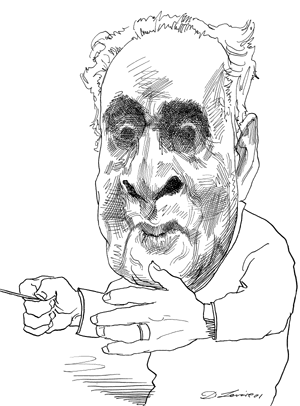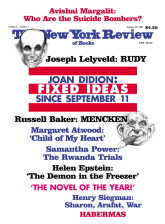To the Editors:
In his review of our book Bruno Walter: A World Elsewhere [NYR, February 14, 2002], Allan Keiler regrets that we have not discussed the relationship between Walter and the soprano Delia Reinhardt in greater detail; he finds it “curious,” for example, that we “make no mention of Reinhardt’s recordings” and then, to redress this alleged deficiency, proceeds to compare Reinhardt on record to Lotte Lehmann and Elisabeth Schumann. Apparently Keiler missed the second paragraph of the chapter entitled “Delia”—a discussion of Reinhardt’s recordings that, as it happens, also uses Lehmann as a point of comparison:
The handful of recordings Reinhardt made in the early electrical period have often been reissued—testimony to her long-standing popularity in Germanic countries. Her recorded repertoire includes famous arias and set pieces of Agathe, Cherubino, Eva, Elisabeth, Elsa, and Sieglinde. Much in her voice is admirable: there is some of the steely strength of a Frida Leider, some of the impassioned drama of a Lotte Lehmann. In a way, it was the perfect voice for the standard German operatic repertoire. Unfortunately, for those who have heard her more successful peers, Delia Reinhardt may prove something of a disappointment, sounding like an undeveloped Leider or Lehmann, giving us too little of what the other singers gave in such abundance.
While we take a noncommittal stance on certain aspects of the relations between Walter and Reinhardt, we in fact offer more commentary on that relationship than Keiler would lead one to believe. Keiler, for instance, says nothing about Reinhardt’s strong belief in the spiritualist ideas of Rudolf Steiner and her insistence that Walter himself explore Steiner’s writings, which he did with great enthusiasm in the last years of his life. Nor is there mention of the recitals that Walter and Reinhardt prepared in the late 1940s, or the reported objection on the part of Walter’s daughter Lotte to marriage between Walter and Reinhardt. Yet these matters are all discussed in our biography.
Indeed, the review—which barely glances at Walter’s activities after 1922—might leave one with the impression that we have neglected such crucial issues as Walter’s persecution at the hands of the Nazis, his career in the United States, his postwar relations with artists who remained in Germany throughout the Nazi era, and his deep interest in anthroposophy. Readers curious about such matters might find some value in our examination of these and other facets of Walter’s long and eventful life.
Erik Ryding
Rebecca Pechefsky
Brooklyn, New York
This Issue
January 16, 2003




